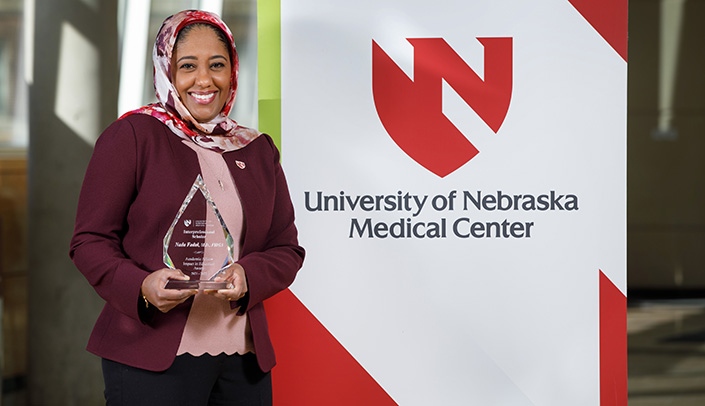Nada Fadul, MD, is the recipient of the Interprofessional Education Scholar Award. The award recognizes an individual who has made significant contributions to interprofessional education locally, regionally or nationally.
- Name: Nada Fadul, MD
- Titles: Assistant dean for diversity, equity and inclusion (DEI) education programs, UNMC College of Medicine; medical director, Specialty Care Center, associate professor, UNMC Division of Infectious Diseases
- Joined UNMC: September 2018
- Hometown: Wad Medani, Sudan
You are the recipient of the Interprofessional Education Scholar Award. Why is interprofessional education important in today's health care fields?
Interprofessional learning is a great tool to enhance the interdisciplinary model of health care. Learning together, students are able to understand the importance of collaborative practices in real-world situations. During my palliative care fellowship, I noticed early on that when the whole team comes to the table to discuss a case presentation, the different perspectives added from each health care team member were of great insight and value. This opened my eyes to issues that I would have not thought about if I had only learned from physicians. For example, spiritual challenges noted by the chaplain were very relevant to the mental and physical well-being of many patients dealing with end-of-life issues. Since then, I have become a champion and advocate for interprofessional learning and have been able to apply it successfully at U.S. academic institutions and globally.
Describe your proudest moment as an educator. My proudest moment is when I see a mentee of mine rise to become a leader and succeed in their field, especially when I see them becoming a champion of interprofessional education.
What advice would you give other faculty members who want to have an impact in education?
Teach with empathy and remind yourself of your “purpose” while teaching. It makes all the effort absolutely worth it.
Do you have a favorite quote or philosophy on teaching? My teaching philosophy is centered on inclusion, mentorship and empowerment of learners. I believe that all students and trainees have unique aspects and life experiences that can enrich the learning environment. To me, true success in education is about inspiring learners to exceed their own expectations, gaining their trust to think innovatively and allowing them to practice learning in a safe environment where they can express their individual uniqueness.
